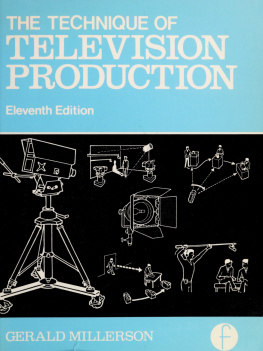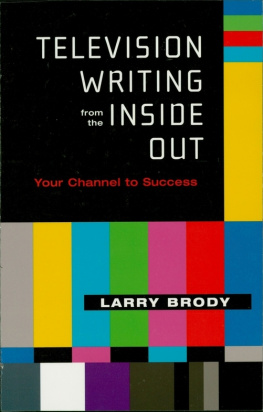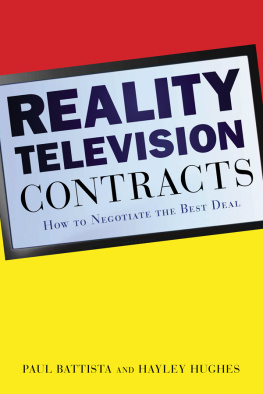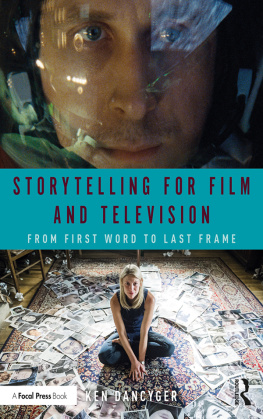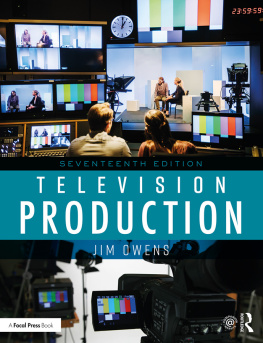Millerson - The technique of television production
Here you can read online Millerson - The technique of television production full text of the book (entire story) in english for free. Download pdf and epub, get meaning, cover and reviews about this ebook. year: 1985, publisher: London ; Boston : Focal Press, genre: Romance novel. Description of the work, (preface) as well as reviews are available. Best literature library LitArk.com created for fans of good reading and offers a wide selection of genres:
Romance novel
Science fiction
Adventure
Detective
Science
History
Home and family
Prose
Art
Politics
Computer
Non-fiction
Religion
Business
Children
Humor
Choose a favorite category and find really read worthwhile books. Enjoy immersion in the world of imagination, feel the emotions of the characters or learn something new for yourself, make an fascinating discovery.
- Book:The technique of television production
- Author:
- Publisher:London ; Boston : Focal Press
- Genre:
- Year:1985
- Rating:4 / 5
- Favourites:Add to favourites
- Your mark:
- 80
- 1
- 2
- 3
- 4
- 5
The technique of television production: summary, description and annotation
We offer to read an annotation, description, summary or preface (depends on what the author of the book "The technique of television production" wrote himself). If you haven't found the necessary information about the book — write in the comments, we will try to find it.
The technique of television production — read online for free the complete book (whole text) full work
Below is the text of the book, divided by pages. System saving the place of the last page read, allows you to conveniently read the book "The technique of television production" online for free, without having to search again every time where you left off. Put a bookmark, and you can go to the page where you finished reading at any time.
Font size:
Interval:
Bookmark:

Millerson, Gerald
This book was produced in EPUB format by the Internet Archive.
The book pages were scanned and converted to EPUB format automatically. This process relies on optical character recognition, and is somewhat susceptible to errors. The book may not offer the correct reading sequence, and there may be weird characters, non-words, and incorrect guesses at structure. Some page numbers and headers or footers may remain from the scanned page. The process which identifies images might have found stray marks on the page which are not actually images from the book. The hidden page numbering which may be available to your ereader corresponds to the numbered pages in the print edition, but is not an exact match; page numbers will increment at the same rate as the corresponding print edition, but we may have started numbering before the print book's visible page numbers. The Internet Archive is working to improve the scanning process and resulting books, but in the meantime, we hope that this book will be useful to you.
The Internet Archive was founded in 1996 to build an Internet library and to promote universal access to all knowledge. The Archive's purposes include offering permanent access for researchers, historians, scholars, people with disabilities, and the general public to historical collections that exist in digital format. The Internet Archive includes texts, audio, moving images, and software as well as archived web pages, and provides specialized services for information access for the blind and other persons with disabilities.
Created with abbyy2epub (v.1.6.7)
Digitized by the Internet Archivein 2018 with funding fromKahle/Austin Foundation
https://archive.org/details/techniqueoftelevOOOOmill
The
Technique
of
Television
Production
THE TECHNIQUE OF DOCUMENTARY FILM PRODUCTION
THE TECHNIQUE OF EDITING 16 mm FILMSJohn Burder
THE TECHNIQUE OF THE FILM CUTTING ROOM
THE TECHNIQUE OF FILM EDITING
THE TECHNIQUE OF FILM MUSICJohn Huntley and Roger Manvellrevised by: Richard Arnell and Peter Day
THE TECHNIQUE OF PROFESSIONAL MAKE-UP FOR FILM,TELEVISION AND STAGEVincent J-R Kehoe
THE TECHNIQUE OF THE MOTION PICTURE CAMERA
THE TECHNIQUE OF SPECIAL EFFECTS CINEMATOGRAPHY
THE TECHNIQUE OF LIGHTING FOR TELEVISIONAND MOTION PICTURESGerald Millerson
THE TECHNIQUE OF SPECIAL EFFECTS IN TELEVISION
THE TECHNIQUE OF TELEVISION NEWS
THE TECHNIQUE OF TELEVISION PRODUCTION
THE TECHNIQUE OF RADIO PRODUCTION
THE TECHNIQUE OF THE SOUND STUDIO
Contents
Preface 13
1 Studio tour 15
The television studio 15
The television studio in action 16
The production control room 19
Master control 22
2 How television works 24
The video signal 24
Color television 24
Picture detail 29
Tonal contrast 29
Tonal gradation 30
3 What your camera can do 31
The lens 31
The lens system 31
Focal length and lens angle 32
Perspective distortion 35
Long-focus lens (narrow-angle lens) 36
Short-focus lens (wide-angle lens) 39
Supplementary lenses 40
The zoom lens 40
Focus controls 43
Lens aperture/-stop 45
Neutral density filters 47
Camera-tube sensitivity 47
Mountings for lightweight cameras 48
Static mountings 49
The rolling tripod 49
The studio pedestal 49
The small crane 51
Larger cranes 51
Motorized dolly 52
Low dollies (creepers) 54
Hydraulic platforms (cherry-pickers; Simon crane) 54
Remotely controlled cameras 54
Pre-rehearsal camera checkout list 54
Basic camera operation 55
4 The persuasive camera 58
Defining the shot 59
Selecting the length of shot 59
The very long shot (vista shot) 60
The long shot 60
Medium shots 61
The closeup 61
Deep-focus techniques 62
Shallow-focus techniques 62
Moving the camera head 65
Panning the camera 65
Tilting the camera head 67
Camera height 68
Moving the camera 70
Subjective treatment 72
Using a zoom lens ' 76
5 Composing the picture 79
Composition by design 79
Composition by arrangement 79
Composition by selection 80
The director and composition 80
Composition principles 80
The effect of the picture frame 80
Proportions 81
Framing 83
Pictorial balance 84
Emotional influence of tone 87
Scale 88
Subject prominence 88
Subject attitude 90
Picture shape 90
Unifying interest 90
Speed of composition lines 91
Continuity of centers of interest 91
Composition continuity in multicamera production 91
Color and the picture 94
Dynamic composition 99
Potentials of the still picture 99
Potentials of the moving picture 100
A theory of dynamic composition 101
Accepted maxims 102
Mirror images 105
6 Editing 107
The nature of editing 107
Editing and the TV director 108
Television editing techniques 108
Types of editing 109
Continuity cutting 110
Relational cutting no
Dynamic cutting 111
The cut ill
The fade 113
The mix (dissolve, lap dissolve) 115
The wipe 117
Superimpositions (half-lap dissolves, supers) 119
Order of shots 120
Duration of shots 121
Cutting rate 123
Cutting rhythm 123
The production switcher 124
Basic production switcher functions 126
7 Lighting 129
Influence of lighting 129
Why is lighting necessary? 129
Light qualitydispersion 130
Direction of the light 131
Light intensity 132
Pictorial quality 132
Color quality of light 132
Lighting flat surfaces 133
Lighting an object 133
Lighting people 136
Lighting areas 139
Pictorial treatment 142
Light sources (luminants) 144
Types of lamp housingluminaires 147
Lamp supports 149
Light control 150
Lighting control equipment 150
TV lighting problems 152
Electronic problems 153
Sound boom shadows 153
How settings affect lighting treatment 154
Other factors affecting lighting 154
Lighting for color 155
Atmospheric lighting 156
Lighting effects 160
8 Scenery 161
Basic organization 161
Basic scenic forms 164
The flat 164
Set pieces (built pieces/solid pieces/rigid units) 166
Profile pieces (cut-outs) 167
Cyclorama 168
Backgrounds 168
Surface detail and contouring 170
Floor treatment 171
Ceilings 173
Size and shape of sets 173
Shooting off (overshoot) 173
Height and depth in floors 174
Space economies 175
Multiplane techniques 175
The illusion of four walls 177
Partial settings 178
Realism of settings 179
Scrim (scenic gauze) 180
Mobile scenic units 180
Set dressing 181
Electronic and lighting considerations 182
Staging for color 185
Next pageFont size:
Interval:
Bookmark:
Similar books «The technique of television production»
Look at similar books to The technique of television production. We have selected literature similar in name and meaning in the hope of providing readers with more options to find new, interesting, not yet read works.
Discussion, reviews of the book The technique of television production and just readers' own opinions. Leave your comments, write what you think about the work, its meaning or the main characters. Specify what exactly you liked and what you didn't like, and why you think so.

